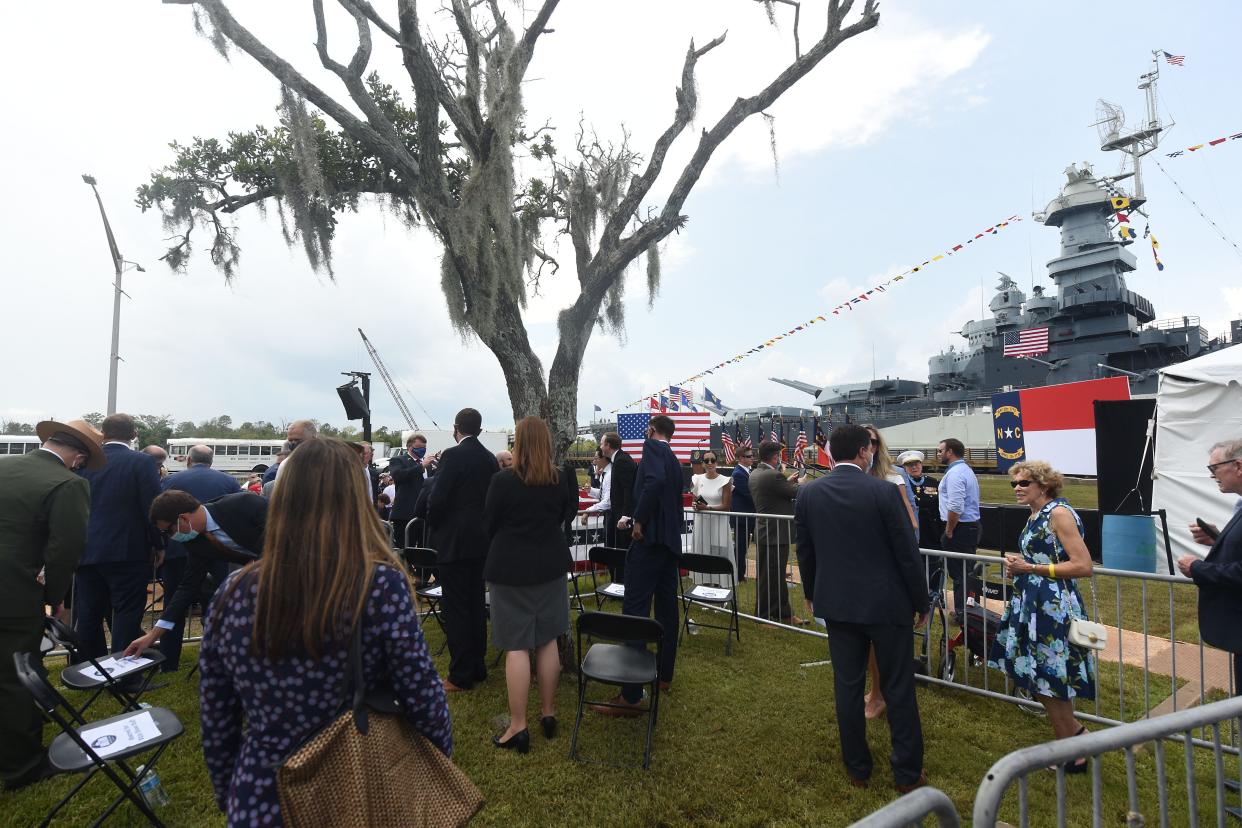Opinion: Wilmington could do more to capitalize on its World War II Heritage City designation

Following its designation as America’s first World War II Heritage City, has Wilmington capitalized on this golden opportunity for earned national recognition?
Most indications say not yet.
On Sept. 2, 2020, at the Battleship North Carolina, the president of the United States announced our designation.
This action culminated a 12 1/2 year project Wilmington conceived, organized, and led, and established a new history preservation program administered by the National Park Service.
Subsequently, the NPS added 18 heritage cities, as my July 30 StarNews column reported.
Opinion: As the first World War II Heritage City, Wilmington started a nationwide trend

Wilmington -- contextually here also New Hanover County -- deserved this designation through its wartime contributions and legacy preservation.
The project resonates as a classic case study of public-private partnership, leadership, and determination involving volunteers, local and state elected officials and staffs, organizations, media, and North Carolina’s congressional delegation.
Participating in the project from start to finish occupied a substantial part of my professional and business life. Subsequently, the mode shifted to observing, urging, coaxing, cooperating, and delivering to showcase community preservation pride, and tell our story externally. I believe this mode positions one to make ground-level conclusions on whether our area has, or hasn’t, capitalized.
Opinions and conclusions also emanate from perusing organization websites, conversations with officials, the public, and by following the media. Most opinions and conclusions ought to be as plain as day.
After initial self-congratulatory flurries, local business and government enthusiasm apparently receded. Rank and file citizens appreciated the prominence, but broadcasting and promoting it couldn’t gain traction.
Unique history awaits exploitation
Of course, “all isn’t lost.” Strategies and plans can be re-imagined and redirected.
Our area’s unique history from early days awaits exploitation. Elected officials, staffs, and business and community organizations can still combine vision, originality, and initiative to capitalize on the Heritage City designation.
Wilmington can revisit and reconstruct parameters for the project’s originally perceived objectives of economic gain, global WWII community exposure, destination tourism - and regional and state pride.
For instance, take the attractive NPS WWII Heritage City logo, created for our program. Along with the city’s informative welcome entry sign, nothing’s difficult about an organization deploying both for PR purposes - and linking to the city’s Heritage City website element and superb “World War II Heritage Guide” brochure.
Although a potential WWII sites marked trail and guided tours haven’t materialized, surely we can find firms to build them. To invite global attention, we can utilize the contact lists I provided of national WWII media,and military and veterans organizations.
Wilmington Mayor Bill Saffo is aware. We exchanged ideas and promising avenues he’s pursuing that could involve the state government.
New Hanover County Manager Chris Coudriet indicated action, particularly empowered by the enlarged museum capabilities of Project Grace, approved by the Local Government Commission on October 3rd. His proposal to examine the prospect of a county-city commission coordinating history and military heritage is launched. Its working group includes my input, which likely could merge the below recommendation regarding just history preservation.
Create a history coalition Here’s a thought I’ve incubated for some time.
Why not establish an organization to market and brand our history? Meld our WWII legacy with other periods. Then promote all.
Selling area appeal isn’t just horse-drawn carriages, golf courses, beaches, museum houses, festivals, ghost tours, and concerts. Savannah and Charleston got way ahead. What makes us different from a hundred competing communities?
History, that’s what - a national history destination. “Wilmington and New Hanover County - History Is Us!” - a slogan shouts.
Create a history interpretation coalition or commission. Council and Commissioners appoint experts from each of these areas, plus management professionals.
The coalition would energize, advise, formulate, and execute plans:
Colonial-Revolutionary Era; Antebellum Era; Civil War; African-American Community; Early Twentieth Century; WWII; and to The Present. Include the History Preservation Commission, WWII Wilmington Home Front Heritage Coalition, and Cape Fear Museum.
Wilmington, the golden opportunity remains. Who shall lead?
Wilmington native Wilbur Jones is a retired Navy captain, military historian, and author/co- author of 20 books, including 8 on WWII and 2 on wartime Wilmington. He was heavily involved in the WWII Heritage City project. See wilburjones.com.
This article originally appeared on Wilmington StarNews: Wilmington needs to capitalize on World War II Heritage City designation

